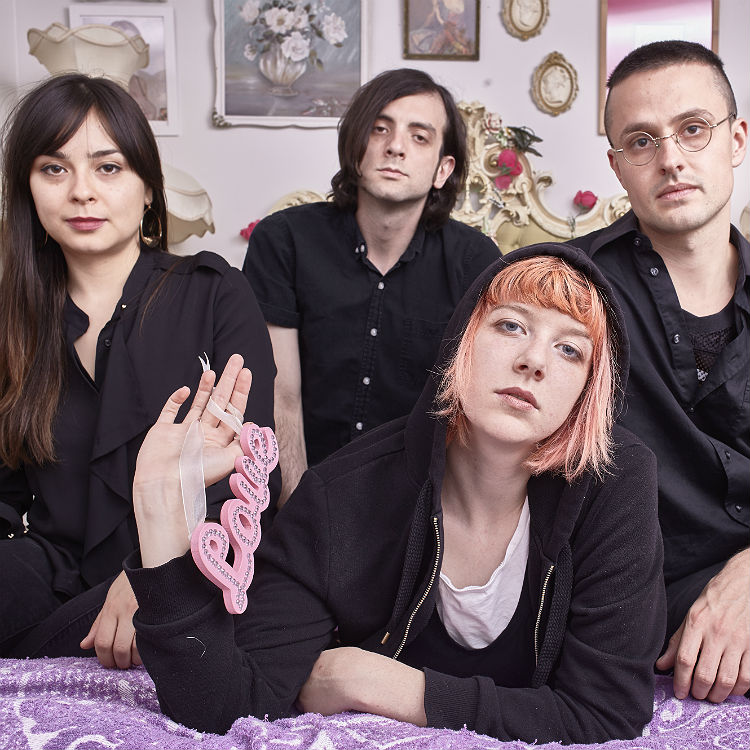 Photo: Press
Photo: Press
The seed for Dilly Dally’s fearless life-affirming angst formed, innocuously, at the back of science class. Bored out of her mind, a 14-year-old Katie Monks found a kindred restless spirit in Liz Ball. Little work got done. Their bond was only truly sealed months later, when an opportunity to see The Strokes emerged.
“They'd just put out Room on Fire” remembers Monks. "They didn't come to Toronto to play but were playing in New York. I was a huge fan at the time and Liz’s friend had an extra ticket, so I ended up sneaking off with Liz even though I didn't know her that well."
Despite her excitement, Monks admits to being, in typically teenage fashion, prejudicially dismissive of her side-kick: “I thought, 'Man this girl doesn't even like the band for the tunes, she just says that ‘cos she thinks all the guys are cute in it! I really love the music and there's no way someone could love that band as much as me!'"
As it turns out Monks had met her match. "We were in the car going down and she knew all the words, she knew more than I did. I was like, 'What the fuck... She's a serious fan, serious about music'." A shared interest that continued to grow and dominate their lives.
Fast forward five years, numerous shared joints and endless album obsessions later and the friends finally decided to make the leap from sleepy suburbs, moving into a tiny flat in Toronto. Shift work bartending, waitressing and anything else going became the norm as they chased the dream of “starting a fucking worthwhile band."
“It took us a long time to have the guts to start playing music together,” admits Monks. "Before that it was mostly just for ourselves secretly. But when we got a place together it forced us to cut loose – it was the only way to really make it happen. And so we started looking for people to play drums and bass."
Watch the video for 'Desire' below
This wasn’t an easy process. The band endured a sliding doors period of numerous iterations, but are now finally settled on a partnership that brings out the best in all. Drummer Benjamin Reinhartz “adds weight and plays really darn loud,” says Monks, while bassist Jimmy Rowlinson is “a lot more active and brings physicality”.
“This helped Liz and I come out of our shell in our own ways. When they joined we started getting attention for our live show. I get lost in it, my voice gets louder. We’re all in."
The voice is something impossible to ignore – visceral and urgent, anguished yet confidently aggressive, the embodiment of the songs on record. Obvious comparisons will be drawn with a certain Kurt Cobain, the reluctant figurehead of a musical era that the band don’t shy away from. After all, Ball and Monks grew up on the likes of The Pixies, Smashing Pumpkins and The Libertines, alongside the Britpop sensibilities of Blur and '90s Radiohead.
Yet they did more than just connect with the sound and lyrics, inspired most by the pick up and play honesty; the “feeling and uneducatedness of it,” as Monks puts it. “That's what I always thought was cool – it's music that makes you feel like you can do it too. It's saying to kids it's not impossible, you don’t have to be a genius”.
“That for me is true in all parts of my life; I've moved away from pretension and tried to speak a language that's a bit more universal and not cut people out”.
Of course this drive for passion and honesty can often be misinterpreted, exposing grassroots bands like Oasis to misdirected claims that, despite their phenomenal success and cultural impact, they made “music for luddites”, in the words of Bloc Party’s Kele Okereke. I quiz Monks over comments made in an interview with KEXP where she called Dilly Dally’s music as being “easy” to play. She’s keen to put the record straight, and for the first time there’s a flash of steely determination behind the warmth. “Yeah I said that before, but I'll tell you now those songs are not easy to play, I’d be selling us short to suggest that. I meant my guitar parts”.
“Even if the structures are more immediate than some bands Liz’s guitar parts are tough, my singing is tough. I’ll be honest there are some nights with 'Witch Man' where I'm like, 'Guys I can't do the howl tonight’, it's a bummer but that just means when we play it it's extra special”.
There is a confidence and honest focus in the response that speaks volumes for Dilly Dally’s ethos. Monks points to how noughties guitar music strangled itself not through a lack of complexity, but a lack of urgency. It became “self-indulgent, showy and packaged”, she says.
"It’s the same with alt-rock in the late 90s, Nirvana turned into Puddle of Mudd and Nickelback. Green Day turned into Good Charlotte and what began as The Strokes suddenly morphed into Jet." Dilly Dally is the product of Monks and Ball growing up in that transition and wanting to reconnect rock, and refresh the cycle.
They are not alone. It is more than coincidence that a whole wave of grunge ridden, female-fronted bands are beginning to break – from Nashville's Bully to London’s Wolf Alice. “It's genuine, new and its happening and I believe that what we're doing, in our make-up, is something new despite the comparisons with earlier male rock bands. Women have a lot of undiscovered territory in this genre."
“There's a lot of female stuff that hasn't been explored,” says Monk, and this runs deeper than ‘Snake Head'’s literal reference to “blood between my legs”. “I think women have a different experience in this world, as have women in the past, women in the 90s, and as women do now,” she continues. “They are the new personas to be explored, women can be portrayed in these different ways. Bully hit us up and said, 'What's up, we love you guys we wanna play shows with you’. It's cool that people have been hitting us up in the same wavelength, it's really special”.
It is a change that can’t come soon enough. Only a year ago Reading + Leeds was forced to hang its head over having only four female fronted bands on its entire festival bill. And yet despite this, some within the industry bemoan the burgeoning sea change, murmuring that "it’s all women now."
Monks has strong words for these people: “That's crazy – like people who say feminism is sexist. I mean, there are probably a lot of male fronted bands that aren't getting the same kind of attention right now, but that’s because they're exploring the same kind of territory - it's kind of like been there done that. It’s been unequal for us on the other side of the fence for a long time."
But how can she be sure that, when the scene Dilly Dally are helping form fully explodes, they stay true and honest to themselves, and don’t become the devil of everything they are fighting for?
“We all in this band know the dangers - first of all Liz will never let that happen, she's the realest bitch I've ever met, she would never let us do something that isn't real..." Coming right on cue, Ball arrives to push for our interview to be wrapped up. There are places to be, jet lag twisting the mind and the whole of Europe to explore. "See what I mean," says Monks laughing wryly. "All I can say is, we’ve been hustling at this for a long time, had labels try to change us but I'm not gonna fuck this up, I have been so fucking heartbroken by bands before. I'll do my absolute best that's all I can say."
See Dilly Dally's forthcoming UK tour dates below.
22 January - Leeds, Brudenell Social Club
23 January - Manchester, Castle Hotel
24 January - Glasgow, Broadcast
25 January - Birmingham, Hare and Hounds
26 January - Bristol, Louisiana
27 January - Brighton, Green Door Centre
28 January - London, The Lexington
29 January - Aldershot, West End Centre
















